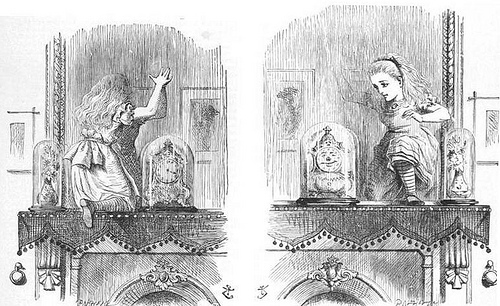“Prosperity doth best discover vice, but Adversity doth best discover virtue.” Francis Bacon
Fugue State

John lives in an East Coast state and Mary in a West Coast state. During a phone conversation one night, they realize that it is the same time in both locations. How can this be?
A Kitchen Prediction
It is difficult to understand how the old-world fashion of … ‘washing up’ plates and dishes can have endured so long. Of course, in the new age, these utensils will be simply dropped one by one into an automatic receptacle; swilled clean by water delivered with force and charged with nascent oxygen; dried by electric heat; and polished by electric force; being finally oxygen-bathed as a superfluous act of sanitary cleanliness before being sent to table again. And all that has come off the plates will drop through the scullery floor into the destructor beneath to be oxygenated and made away with.
– T. Baron Russell, A Hundred Years Hence, 1906
(Mechanical dishwashers had existed since the 1850s, but they were hand-powered. Modern dishwashers weren’t common until the 1970s.)
In a Word
bemissionary
v. to annoy with missionaries
A Vanishing

Patented in 1896, Sam Loyd’s “Get Off the Earth” puzzle reportedly sold more than 10 million copies during the puzzlemaker’s lifetime, making it one of the most popular puzzles of all time.
There are 13 men in the figure on the left. Rotating the earth produces the figure on the right — which has 12 men. What happened to the 13th man?
Achilles in Uruguay
Doubtful but interesting: I’ve found four secondhand accounts that in December 1827 a planter working in a field near Montevideo discovered a tombstone covered with unknown characters, and that it covered a small excavation containing two rusted swords, a helmet, a shield, and a large earthen vessel.
According to the story, the legible part of the inscription was in Greek: “During the dominion of Alexander, the son of Philip, King of Macedon, in the sixty-third Olympiad, Ptolemais–”
The handle of one of the swords reportedly displayed the portrait of a man, supposedly Alexander the Great, and one of the helmets had been sculpted with the image of Achilles dragging the corpse of Hector around the walls of Troy.
The implication is that the ancient Greeks had reached South America — that a commander in Alexander’s fleet was overtaken by a storm in the Atlantic and driven to the Brazilian coast, where he established a monument to commemorate their presence there.
“The interesting nature of this account is sufficient to make us regret its manifest improbability,” writes the Foreign Review. “Such a discovery in Brazil from the time of Alexander is not likely to receive authentic confirmation.”
(The other accounts are in Josiah Priest, American Antiquities, and Discoveries in the West, 1833; The Native Races of the Pacific States of North America, 1876; and Elroy McKendree Avery, A History of the United States and Its People, 1904.)
No Nobel
Marvin Hamlisch won four Emmys, four Grammys, three Oscars, a Tony, two Golden Globes, and the Pulitzer Prize.
The Mirror Problem

In 1868, 8-year-old Alice Raikes was playing with friends in her London garden when a visitor at a neighbor’s house overheard her name and called to her.
“So you are another Alice,” he said. “I’m very fond of Alices. Would you like to come and see something which is rather puzzling?” He led them into a room with a tall mirror in one corner.
‘Now,’ he said, giving me an orange, ‘first tell me which hand you have got that in.’ ‘The right,’ I said. ‘Now,’ he said, ‘go and stand before that glass, and tell me which hand the little girl you see there has got it in.’ After some perplexed contemplation, I said, ‘The left hand.’ ‘Exactly,’ he said, ‘and how do you explain that?’ I couldn’t explain it, but seeing that some solution was expected, I ventured, ‘If I was on the other side of the glass, wouldn’t the orange still be in my right hand?’ I can remember his laugh. ‘Well done, little Alice,’ he said. ‘The best answer I’ve had yet.’
“I heard no more then, but in after years was told that he said that had given him his first idea for Through the Looking-Glass, a copy of which, together with each of his other books, he regularly sent me.”
His Mark
The longest word in Shakespeare appears in Act V, Scene 1 of Love’s Labour’s Lost:
O, they have lived long on the alms-basket of words.
I marvel thy master hath not eaten thee for a word;
for thou art not long by the head as
honorificabilitudinitatibus: thou art easier
swallowed than a flap-dragon.
It’s the ablative plural of the Latin honorificabilitudinitas, “the state of being able to achieve honors.” And it can be rearranged to spell hi ludi, F. Baconis nati, tuiti orbi, which means “These plays, F. Bacon’s offspring, are preserved for the world.”
So that settles that.
Bootstraps Everlasting
I recently visited an Eastern sage and asked him, ‘Is it possible to live for ever?’ ‘Certainly,’ he replied, ‘You must undertake to do two things.’ ‘What are they?’ ‘Firstly, you must never again make any false statements.’ ‘That’s simple enough. What is the second thing I must do?’ ‘Every day you must utter the statement “I will repeat this statement tomorrow.” If you follow these instructions faithfully you are certain to live forever.’
— Jacqueline Harman, letter to the Daily Telegraph, Oct. 8, 1985

